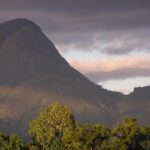
The global agarwood trade heavily depends on wild-harvested endangered tree species, despite international regulations for protection, with significant volumes going undocumented in official trade records, a new study reveals.
About 70% of the trade depend on Aquilaria filaria and Aquilaria malaccensis, both threatened species, sourced from the wild, raising major sustainability concerns. Meanwhile, there are some tree species that are not even covered by CITES, the global wildlife trade convention.
Due to discrepancies between CITES and customs data, along with weak enforcement and outdated regulations, researchers suggest the illegal trade is far larger than reported.
Researchers urge stronger monitoring, updated data, expanded species protection, and a shift to cultivated sources. They also call on consumers and wealthy importers to support conservation and governments to promote sustainable practices.
FSC and Assurance Services International (ASI) announce the launch of the Teak Corridor transaction verification (TV) loop. FSC and ASI have conducted TV loops on FSC-certified high-value timber species like teak (Tectona grandis) in the past. The previous teak TV loop, along with other available information, indicate the possibility of integrity risks in the segregation of FSC-certified and non-certified teak in the supply chains.
Therefore, FSC recommends certificate holders with teak in their certification scope to apply additional due diligence in selecting their teak suppliers and following FSC rules to ensure that the teak products they purchase are legitimate and within the FSC certificate scope of the seller.
Deforestation Inc. reporters in a dozen countries investigated weak government efforts and loopholes allowing companies to keep trading Myanmar teak, a natural resource controlled by the military junta.
The Deforestation Inc. investigation by ICIJ and its 39 partners found that timber traders in three continents have continued to import Myanmar teak by the ton to supply shipbuilders and furniture manufacturers around the world, while consumers may be unwittingly financing the junta’s repressive campaign.
The reporters visited boat shows in Fort Lauderdale, Amsterdam and Paris to learn about the international teak market. They interviewed timber traders in 11 countries and pored over documents leaked from Myanmar’s tax agency and shared with ICIJ by Justice for Myanmar, a human rights group, U.K.-based news outlet Finance Uncovered and Distributed Denial of Secrets, a data transparency group.
********
Cases from Slovenia, Croatia, USA, Italy, the Netherlands, Germany, New Zealand, Turkey, Taiwan, France, and India are included.
Click here to access the Global Illegal Logging and Associated Trade (ILAT) Risk assessment tool and to download the Forest Trends User Guide describing the functionality of the ILAT Risk Data Tool.
Click here to access the Cattle Data Tool.



